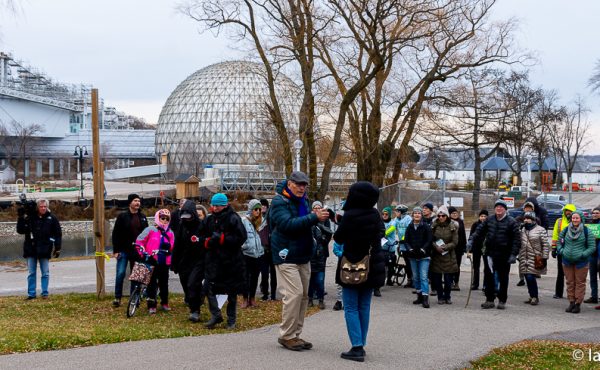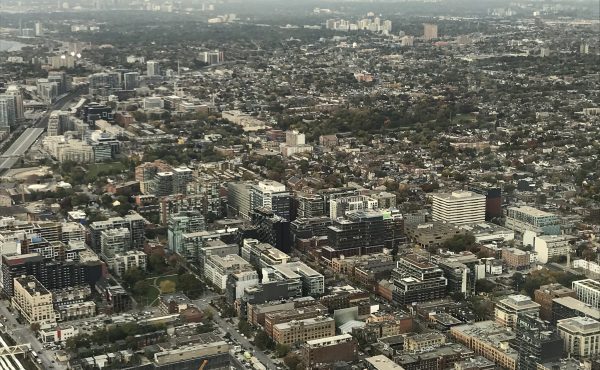
Alan Broadbent is a businessman and philanthropist who has played an important behind-the-scenes role over the last 15 years in generating a “cities” agenda in Canadian politics and public discourse. He has been a guiding influence behind initiatives such as Ideas that Matter, which gives out the Jane Jacobs Prize, and the “Charter for Toronto” idea. The Maytree Foundation, which he chairs, is involved in a wide range of programs that benefit cities and work on issues faced by immigrants.
With the publication of his book Urban Nation, Broadbent is stepping our from behind the scenes into the limelight. The book succinctly summarizes his thinking about the role and challenges of cities in Canada, developed over years of discussion with experts, advocates, and politicians.
Many of the themes and arguments in the book have been heard before in various reports and proposals generated by his behind-the-scenes work, but this book brings them together in an accessible format, enriched by a more personal voice. It works as a kind of primer about urban issues in Canada, and also as a repository of ideas — some sensible, some radical — about what to do about them. While Broadbent is usually clear about which ideas he favours, he always summarizes both the advantages and the problems with any proposal, giving readers plenty of information with which to make up their own minds.
The essential premise of the book is that, as the title indicates, Canada has become an urban nation, but our self-image and our government structures have not yet caught up to this new reality. Broadbent traces the transformation of our nation from a largely rural one into an urban one, with almost 80% of the population living in cities, over the course of the 20th century.
Particularly interesting is his distinction between two phases of urbanization. With industrialization in the mid-20th century, all cities expanded rapidly, both large and mid-sized. From the 1980s, however, he shows that urbanization has been concentrated in the largest cities, especially Toronto, Montreal, and Vancouver. He argues that they are becoming a new kind of city in Canada, with distinctive needs, and require new powers and a new way of thinking if they are to sustain their leading role in Canada’s economy. These are the cities he focuses on (he fluctuates between the cities themselves and their larger metropolitan area, depending on the issue).
Broadbent shows the shortcomings of the current model of large-city municipal governance, in which cities of millions of people, with complex social and infrastructure needs, are governed according to rules set out in 1867 when Canada’s largest cities were little more than towns. While there are many individual problems, such as revenue sources restricted to property taxes and fees, the crucial problem is that cities are entirely dependent on provincial governments for permission to do anything new in any field of activity.
This situation makes it impossible for Canadian cities to develop coherent, long-term programs and infrastructure to deal with the challenges faced by jurisdictions with millions of residents and billions of dollars of economic activity, because funding and powers can be arbitrarily changed or removed at any moment. The various current programs and proposals to “share” federal and provincial revenues (gas taxes, 1% of GST) are not much use because they can be taken away at any time, wrecking whatever programs were dependent on them. Broadbent argues
Control of destiny is at the heart of the new deal for cities. Cities need to be able to have a vision of their future, to create a credible plan to get there, and to implement the policies and programs that make that future vision a reality. (76)
Broadbent surveys many different ideas for addressing this problem, including chapters on potential new revenue sources (he argues that cities need to be able to levy income and sales taxes), and different models of municipal government (he tends to favour stronger-mayor systems, although he does not look at the possibility of creating the subsidiary borough levels of government possessed by many cities with strong mayor systems).
But his most spectacular proposal is that the three major cities should get province-like powers, or even become provinces. I’m skeptical of this idea — to me, the idea that big cities should separate from the province around them is like a body’s internal organs saying that, because they do all the body’s most important work, they should separate from the flesh. But Broadbent’s arguments at least made me think more closely about the idea, pointing out the many ways in which issues under provincial jurisdiction, such as health and immigrant settlement, differ considerably in big cities compared to the rest of a province.
One possibility Broadbent does not really examine in detail is the intermediate idea that cities could get more complete power over those areas of jurisdiction they are currently assigned, becoming genuinely autonomous municipal governments. What if cities had the power to assess any kind of user fee within their boundaries, such as congestion charges, without referring to the province? What if cities could develop their own system to assess properties for taxation, or to organize their government structure?
Toronto, in particular, is hobbled by bizarre anomalies such as paying for a percentage of social services, and interference with planning from the Ontario Municipal Board, that most other municipalities outside Ontario don’t have to contend with. It seems to me that giving cities the ability to exercise their own existing powers and responsibilities without constant oversight would be a crucial first step. People worry that cities would make mistakes, but, as Broadbent notes in a key passage:
The practice of provincial and federal governments treating city governments like children tends to make them act like children. And anyone who has raised children knows that they become responsible people by being given responsibility. (77)
It’s time that big city governments were allowed to take full responsibility for managing municipal issues as they wish, with all the risks and possibilities that entails.
Like many of the discussions of the needs of Toronto and other big cities in Canada, Broadbent describes eloquently the importance of big cities to Canada, and the dangers of the constant neglect and mistreatment they receive. But, like most other discussions of this issue, he leaves out a crucial side of the story, which is an exploration of why Canada’s big cities can’t seem to get any respect. He quotes a baffled Anne Golden, president of the Conference Board of Canada, saying “It’s not as if we haven’t put the right argument to the right people in the right place at the right time before.”
He suggests it may be in part that big cities get less representation in parliaments than their population deserves — and yet, overall, the majority of seats in parliament are still from urban ridings (see for example the mostly urban Liberal majority in Ontario).
Ironically, Broadbent unwittingly provides the answer himself in his own exploration of the importance of big cities. He notes that big cities are where people go to get the best jobs, where the economy is directed from and managed. While big cities may be emasculated politically, in economic terms they are dominant — more so than at any time in the past. This fact is crucial to understanding why big cities get no sympathy. Such dominance inevitably creates resentment and resistance from the rest of the nation.
In effect, the struggle between big cities and the politicians representing the rest of the nation is the worst kind — a struggle between two victims. Big cities see their complete lack of political power, their utter subservience to the whims of provincial governments that do not understand their complex needs, the massive amounts of tax money drained from the city and given to the rest of the nation. But those outside big cities see a dominant economic force, bustling with activity and high incomes, full of specialist services unavailable elsewhere, dominating the media and culture, drawing massive amounts of private money to banks and head offices. How is it, they think, that these people want even more money and power? The problems of big cities won’t be solved until we can understand and address the point of view of those who live outside them.
Urban Nation is an accessible and thought-provoking discussion of the importance of big cities, the challenges they face, and the possibilities for changes that will give them the powers and responsibilities they need. It’s a useful and insightful contribution to a conversation that has been gaining momentum for some time, thanks in part Broadbent’s own efforts. That there is still a great deal to discuss further is a testament to just how important and complex are the issues facing Canada’s cities.
You can join Alan Broadbent for the public launch of Urban Nation on Thursday, May 8th, 7:00 p.m., at the Gladstone Hotel Ballroom in Toronto, 1214 Queen Street West. The event will be hosted by the Toronto Star‘s Christopher Hume, with opening remarks by Mayor David Miller.




5 comments
I recently finished this book, and while I thought many of his ideas for incremental change were excellent (indeed, some like the federal transit pass tax credit have already been implemented), I wondered how likely it was that some of his “big ideas” would get implemented (province-cities).
It seems like very few outside the big cities do not see that Canada’s future is tied to the success of the cities. All of these ideas are just seen as a power grab by people living in cities to change the direction of Canadian politics. For example, Broadbent suggests mashing together most of the smaller provinces into a “Prairie Union” and a “Maritime Union”. Can you imagine a notion like that getting the support of all of the provinces (do support a constitution change)? Ontario and BC couldn’t even get a majority of the province’s population to agree to electoral form (BC-STV and MMP), which would have given just a tiny bit more power to the populous cities.
I think cities have to do more work to sell their importance to the rest of Canada. The whole country needs to start understanding that Canada’s success depends on the cities, and it is not the other way around. And we need to spread these ideas outside of the city limits. For example, MMP in Ontario was hugely popular in a a few ridings inside Torontos, but barely registered elsewhere. Cities need to be tirelessly promoting their benefits to the rest of the country for there to be a real change here.
This should be an exciting book launch, hope to meet some people there!
Florida will come up with these ideas next week.
I was thinking about putting this in my post, but Florida’s latest book, “Who’s Your City?”, has a bit of a case for countries being defined by their largest city-regions.
In particular, the maps he included about “spikiness” are fairly interesting. You can view them on the book’s webpage:
http://creativeclass.com/whos_your_city/maps/
(Look at the “Spiky World” group of maps.)
I’m intrigued about how the focus on cities has evolved… while I (obviously, since I’m involved with Spacing) believe that it is a useful angle for change, I also sometimes wonder how much it is tied to people giving up hope with politics on the federal front.
For example, If the feds did have a workable national childcare policy, or a workable national transit funding scheme, all cities and municipalities would benefit greatly. Yet many cities are now turning inwards and trying to figure how they can get these services in place… rather than looking outwards and building relationships with rural citizens who likely have many of the same values. I understand that it can be easier to get things done on a smaller scale–and that this is largely the product of downloading from on high–but it still seems regretful to me.
Also, for better or for worse, Canada’s economy overall is still largely driven by resource conversion, no matter where the majority of the population lives. So to ignore the people who live and work in those areas — to say that cities are “the” key to Canada — doesn’t quite ring true to me. I’d rather see more integration of dialogue than separation.
Further to Leah’s comment above, it is worth recalling that the first big push for a “new deal for cities” came after years of indifference and hostility from Queen’s Park. Perhaps it was coincidence (or perhaps not) that people recognized that there was another level of government that had less involvement in municipal matters (not to mention barrels of surplus cash rolling around), and that the federal government (at least of the time) could theoretically be swayed into becoming more supportive. So I would say that it may have less to do with people giving up hope with politics on the federal front, and may be more a counter-effect to the Common Sense [sic] Revolution.